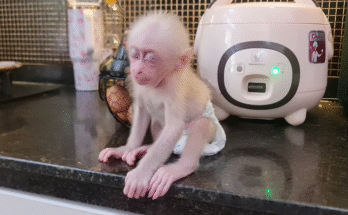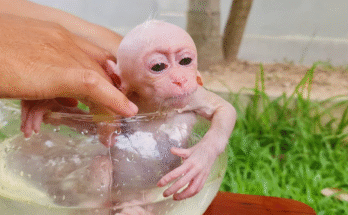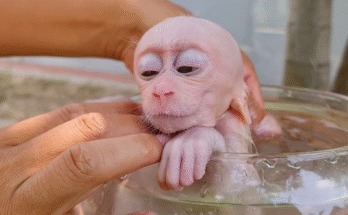Soothe a crying baby monkey with care and precision! Start by identifying the cause—hunger, discomfort, or loneliness. Address these needs promptly with a gentle touch. A cozy blanket and warm cuddles mimic the mother’s comfort in the wild, fostering a sense of security.
Softly stroke their back or pat their head while speaking in a calm tone. This reassures them and reduces stress. Distract with engaging toys or soothing motions like rocking. A safe, loving environment is key to calming their nerves.
Master these tips to create a strong bond and turn tears into trust with ease!
A Soft Touch: How to Stop a Baby Monkey’s Crying Fit
Caring for a baby monkey is a unique and rewarding experience, but it comes with its own challenges—especially when the little one starts crying. Just like human babies, baby monkeys cry to express their needs, discomfort, or emotions. To effectively soothe them, it’s essential to approach the situation with empathy, patience, and a soft touch.
Understand the Cause of Crying
The first step in stopping a baby monkey’s crying fit is understanding why they are upset. Some common reasons include:
- Hunger: Ensure the monkey is fed on schedule with the appropriate formula or food suitable for its age.
- Discomfort: Check for any signs of illness, injury, or irritation. A quick health check can identify potential issues.
- Loneliness: Baby monkeys are social creatures that crave interaction. If they feel isolated, they might cry to seek attention.
By identifying the root cause, you can address their needs directly and effectively.
The Power of a Gentle Touch
Physical comfort is one of the most effective ways to calm a crying baby monkey.
- Cuddling: Wrap them in a soft blanket and hold them close to your chest. This warmth and closeness mimic the nurturing care they would receive from their mother.
- Stroking and Patting: Gently stroke their back, pat their head, or rub their arms. These soothing motions provide reassurance and signal safety.
- Rocking: A slow, rhythmic rocking motion can have a calming effect, helping them relax and fall asleep.
Use Calming Sounds
Your voice can be an incredible tool. Speak softly and calmly, using a soothing tone to comfort them. Some caregivers even play soft music or natural sounds, like gentle rain or forest ambiance, to create a relaxing environment.
Provide Distractions
Distracting a crying baby monkey can redirect their focus and ease their distress. Offer a favorite toy, colorful object, or activity to engage their curiosity. For monkeys, simple puzzles or chew toys often work wonders.
Create a Safe and Cozy Environment
The environment plays a crucial role in a baby monkey’s comfort. Ensure their space is clean, warm, and free from loud noises or sudden movements. Adding a few soft blankets and familiar items can make them feel secure.
The Importance of Consistency and Love
Consistency in care is key to building trust with a baby monkey. When they know you’re there to meet their needs, they’ll feel more secure and less prone to crying fits. Always approach them with love and patience, as their emotional well-being is deeply tied to the way they are treated.
When to Seek Professional Help
If the crying persists despite your efforts, it could be a sign of an underlying health issue. Consult a veterinarian or a primate specialist to ensure the baby monkey is healthy and thriving.
Conclusion
Stopping a baby monkey’s crying fit is a combination of understanding their needs, providing comfort, and creating a safe environment. With a soft touch and a caring approach, you can turn their tears into smiles and foster a deep bond built on trust and love.
By following these steps, you’re not just calming the baby monkey—you’re ensuring their overall happiness and well-being.
First Day Newborn Baby Monkey Cr-y Not Accept For New Home
First Day Newborn Baby Monkey Cr-y Not Accept For New Home
– by unygd – Leave a Comment

A newborn baby monkey’s first day in a new home is often filled with uncertainty and fear. Separated from its natural environment and familiar surroundings, the tiny creature may cry incessantly, expressing its distress and longing for its mother. This emotional reaction highlights the fragile state of baby monkeys, who rely heavily on comfort, warmth, and care. Understanding their needs during this transition is crucial. Gentle handling, creating a safe space, and providing proper nutrition can help ease their adjustment. A calm, nurturing approach fosters trust and ensures the baby monkey begins to feel secure in its new environment.
1. Understanding the Basics of Newborn Monkey Care
Newborn monkeys are highly vulnerable and depend entirely on their caregivers for survival. Their natural mothers provide constant warmth, nourishment, and emotional support, which must be replicated in human care to ensure their well-being.
Key Characteristics of Newborn Monkeys:
- Fragility: Their bones are soft, and their immune systems are underdeveloped.
- Dependency: They require frequent feeding and consistent care.
- Behavior: They exhibit clingy behavior, mimicking their natural bond with their mothers.
2. Creating the Ideal Environment
Temperature and Warmth
Newborn monkeys cannot regulate their body temperature effectively. A warm, controlled environment is critical during the first few weeks of life.
- Optimal Temperature: Maintain a room temperature of 85-90°F (29-32°C) using heating pads or incubators.
- Avoid Overheating: Monitor the temperature to prevent heat stress.
- Skin-to-Skin Contact: If possible, provide skin-to-skin contact to mimic maternal warmth.
Safe Habitat
Prepare a secure and clean space to house the newborn monkey.
- Use a small, enclosed area with soft bedding.
- Ensure the habitat is free from sharp objects or choking hazards.
- Regularly clean and disinfect the area to prevent infections.
3. Feeding Newborn Monkeys
Proper nutrition is vital for a newborn monkey’s growth and development. Since they rely on their mother’s milk in the wild, replicating their natural diet is essential.
Formula Feeding
Consult a veterinarian to determine the most suitable milk formula. Common options include:
- Specialized Monkey Milk Replacers: These are designed to mimic the nutritional profile of monkey milk.
- Goat’s Milk: Often recommended due to its digestibility and nutritional content.
- Human Infant Formula: Used in emergencies but should be adjusted for protein and fat levels.
Feeding Schedule
Newborn monkeys require frequent feedings:
- 0-2 Weeks Old: Every 2-3 hours, including nighttime.
- 3-6 Weeks Old: Gradually reduce nighttime feedings.
- 6 Weeks and Beyond: Introduce solid foods while continuing milk feeds.
Feeding Techniques
- Use sterilized syringes or baby bottles with small nipples.
- Feed the monkey in an upright position to prevent choking.
- Monitor their weight regularly to ensure proper growth.
4. Ensuring Proper Hygiene
Hygiene is crucial to prevent infections in newborn monkeys, whose immune systems are still developing.
- Bathing: Use warm water and a mild, animal-safe soap for occasional baths.
- Cleaning: Wipe the monkey’s body daily with a damp cloth to remove dirt.
- Diapering: If using diapers, change them frequently to prevent skin irritation.
- Sanitation: Regularly clean feeding equipment and the living area.
5. Medical Care and Monitoring
Newborn monkeys require routine medical care to address potential health issues.
Veterinary Visits
- Schedule a check-up within the first week of bringing the monkey into care.
- Regularly monitor for signs of illness, such as lethargy, diarrhea, or poor appetite.
Vaccinations
Consult a veterinarian about vaccination schedules to protect against common diseases.
Common Health Concerns
- Dehydration: Ensure adequate fluid intake to prevent dehydration.
- Respiratory Issues: Keep the environment clean and warm to avoid respiratory infections.
- Parasites: Administer deworming treatments as prescribed by a vet.
6. Emotional and Social Needs
Newborn monkeys are social animals that thrive on emotional bonding and interaction.
Building Trust
- Spend time holding and cuddling the monkey to establish trust.
- Use gentle tones and avoid sudden movements to create a sense of safety.
Simulating Maternal Care
- Wrap the monkey in a soft cloth to simulate being held by their mother.
- Use a stuffed animal for the monkey to cling to when you are unavailable.
Encouraging Socialization
- Introduce the monkey to other compatible animals or caregivers when appropriate.
- Provide toys and activities to stimulate their cognitive development.
7. Transitioning to Solid Foods
As the monkey grows, gradually introduce solid foods to their diet.
Suitable Foods
- Fruits: Bananas, papayas, and mangoes are excellent options.
- Vegetables: Offer cooked carrots, sweet potatoes, and leafy greens.
- Protein Sources: Introduce boiled eggs, tofu, or small amounts of lean meat.
Feeding Tips
- Cut food into small, manageable pieces.
- Monitor for allergies or digestive issues.
- Continue providing milk alongside solids until the monkey is fully weaned.
8. Preparing for Independence
As the monkey grows older, encourage independence to promote healthy development.
Gradual Separation
- Reduce the time spent holding the monkey to foster self-reliance.
- Encourage exploration within a safe environment.
Teaching Natural Behaviors
- Allow the monkey to climb and play to develop motor skills.
- Introduce them to natural foraging techniques using hidden treats.
9. Ethical Considerations in Newborn Monkey Care
Caring for a newborn monkey comes with significant ethical responsibilities.
Legal Compliance
- Ensure you have the necessary permits and licenses to care for the monkey.
- Follow local wildlife protection laws and regulations.
Long-Term Commitment
- Understand that caring for a monkey is a long-term commitment requiring time, resources, and dedication.
Conservation Awareness
- Avoid supporting illegal wildlife trade or exploitation.
- Contribute to conservation efforts by educating others about the importance of protecting monkey habitats.
10. Frequently Asked Questions
How often should I feed a newborn monkey?
Newborn monkeys should be fed every 2-3 hours, including nighttime feedings, during the first two weeks of life.
What should I do if the monkey refuses to eat?
If the monkey refuses to eat, check the temperature of the milk, ensure the feeding equipment is clean, and consult a veterinarian if the problem persists.
Can I raise a newborn monkey as a pet?
Raising a monkey as a pet is not recommended due to their complex needs and the ethical concerns surrounding wildlife care. Always consult with experts and consider alternatives like wildlife sanctuaries.
Conclusion
Caring for a newborn monkey is a rewarding but challenging responsibility that demands time, dedication, and knowledge. By providing proper nutrition, a safe environment, emotional bonding, and medical care, you can help ensure their healthy growth and survival. Always prioritize ethical practices and consider the long-term welfare of these incredible creatures. With the right care and commitment, you can make a significant difference in the life of a newborn monkey.



